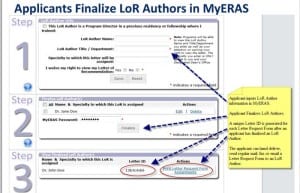For many staring down the barrel of the residency application process, it can be incredibly daunting, if for no other reason than the fact that it is shrouded in mystery. This short guide is a step-by-step breakdown, a direct by-product of personal, hard-earned lessons from the trail from someone who just finished their third consecutive residency application cycle. It is meant to demystify some of the unknowns and answer many of the most commonly asked questions.

– Personal Statement: At the end of the day, you need to be honest with yourself and with programs about who you are. They will see right through a manufactured story. Take my story for example: “I have struggled with an addiction to Cocoa Puffs. It runs in my family. Nighttime is the hardest, when I lie awake thinking about those succulent, perfectly aerated balls of modified corn starch and cocoa powder.
Sometimes I’ll find myself at Costco purchasing wholesale cases of the cereal without remembering how I got there. Yes, I could have let this debilitating mental illness define me, but I decided to write my own story. Watching my grandfather aspirate a puff on a horrific binge when I was 6 years old was, perhaps, the singular defining moment of my childhood. It haunts me to this day.
It has also made me a more empathetic provider, and it has fueled so much of the research I have done, despite the active discouragement of faculty, administration, and the NIH, who have personally implored me to stop communicating with them. Not everyone will have a story as powerful as mine, but it’s about tapping into your core and finding what drives you. Programs know how to recognize that.”
– Conviction record: Remember, programs don’t just want to see isolated data points, but a clearly thought out, cohesive narrative. You should characterize your convictions as pre-meditated acts rather than crimes of passion, as best as is possible within the publicly available court records and without perjuring yourself, of course.
– Race: I would go with your gut on this one. It’s not about your family’s heritage or an ongoing history of both overt and subtle discrimination against your community or your day-to-day experience within society because of how people insist on assigning you a label and prejudging you. It’s more about how you feel inside.
– Interview Invites: ERAS has gone out, MSPE’s are being sent, and now you just sit back and wait, right? That’s the conventional wisdom, but I suggest taking a more proactive approach.
– Emailing: ERAS applications go out at 9 AM on September 15th. It’s not a bad idea to email program directors (PDs) at 9:01 to make sure they got your application. If you haven’t heard back from them by 9:02 I would suggest calling, and, if they don’t answer, I would just get in my car and drive over.
– Expressing interest in a program you haven’t heard back from: Tattoos of the program’s logo: I would tread with caution here. I have heard from multiple PDs that while they appreciate the level of commitment, this is “an extreme measure that displays a complete lack of perspective and judgment.” If you do decide to go this route, just remember that after multiple application cycles you may start to run out of body space.
Spontaneously picking up the PD’s children from soccer practice and taking them for ice cream: This is actually a “don’t.” Where I come from we would call this a random act of kindness, but in the world of residency program directors this is apparently considered a random act of child abduction, and they will have you arrested.
Pre-interview dinner: This is your chance to cut loose with the residents and get a real feel for the culture of the program, usually with free food and an open bar to boot.
– Establishing dominance: It is essential- and I cannot emphasize this strongly enough- that you find and fight the applicant from the highest ranked med school. It is the only way to establish yourself as the clear alpha.
How to approach:
Assuming this isn’t their first interview day, they will probably know what’s coming, so a simple, “Sorry, but you know I gotta do this” should suffice. Don’t let their faux confusion throw you; they want this just as badly as you do.
If you want to raise the spectacle and send a stronger message, I recommend ripping off your shirt, smashing a beer bottle, and screaming “Who wants to dance with Big Cocoa?” A radius will form around you while you thrust your weapon in all directions, and anyone who comes within arm’s length is fair game.
– Drinking: Common wisdom is to have one or two beers and make some small talk, but you need to separate yourself from the pack on the trail. You may hear other applicants say, “hey, maybe you want to slow down” or “I think you’re going a little too hard,” but remember that this is a game and it’s meant to be played. The key is to not black out while getting just belligerent enough that the chief resident has to drive you back to your hotel. And, just like that, you have guaranteed one on one time that other applicants only dream of.
– Hitting on residents: It all depends on what kind of vibes you’re getting, of course, which can be notoriously difficult to ascertain. I would suggest asking a generic question- call schedules, elective time, etc.- and then, while they answer, just gently brush their hair back and ask them if they want to get out of here. How they respond will tell you a lot about the culture of the program.
This is part 1 of a two-part series. Stay tuned for part 2!